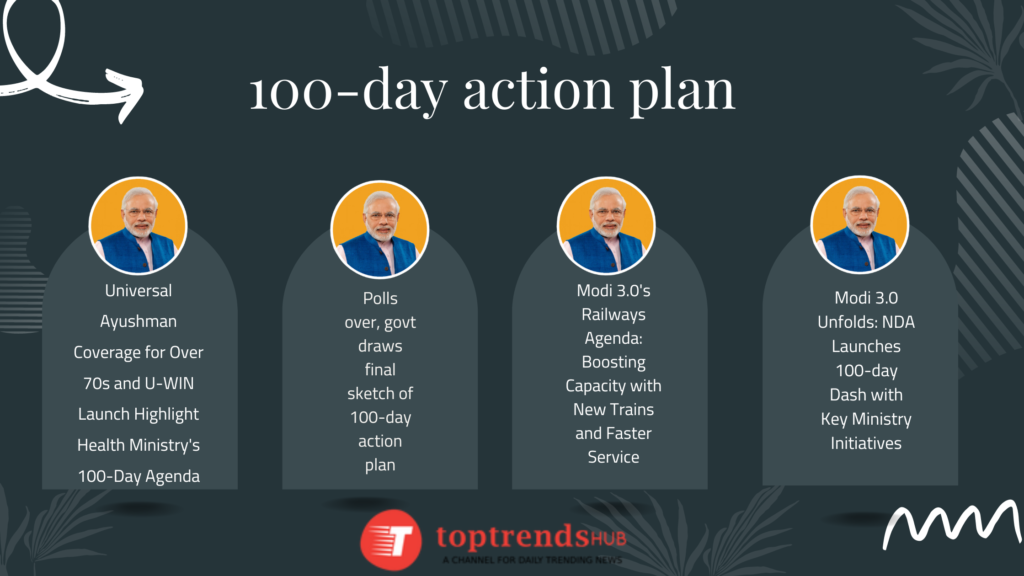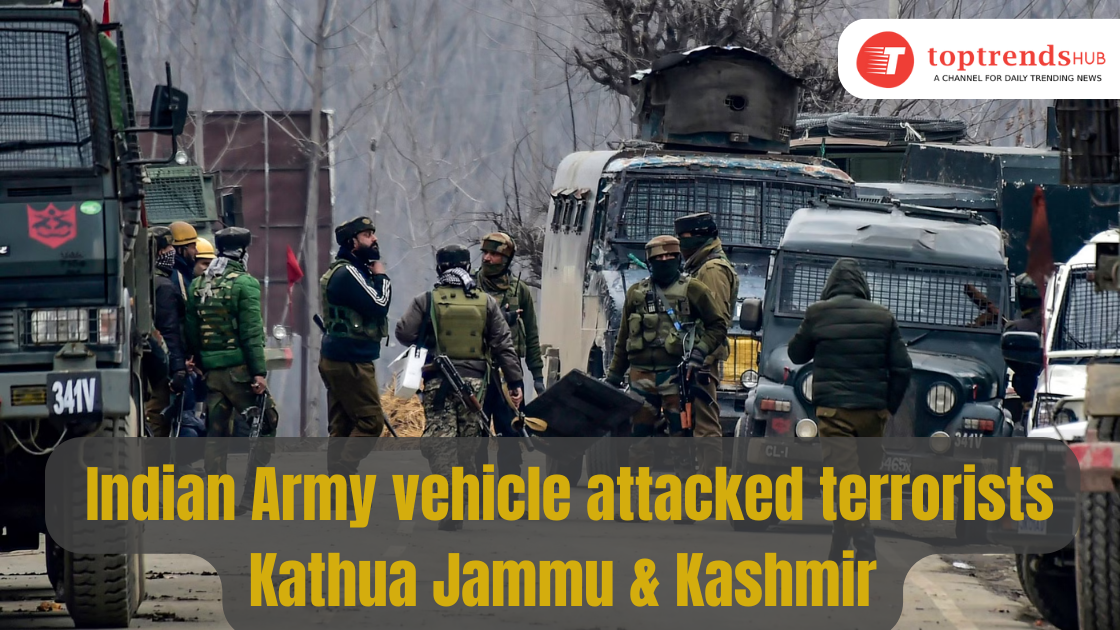Modi 3.0 100 DAY AGENDA The Modi 3.0 governance plan, beginning with the agenda for the first 100 days, aims to include 50 to 70 crucial goals and recommendations. These objectives will prioritize and organize by importance to establish the new government’s tone and intent.
Universal Ayushman Coverage for Over 70s and U-WIN Launch Highlight Health Ministry’s 100-Day Agenda
New Delhi: The extension of Ayushman Bharat coverage to everyone aged above 70 years and the pan-India rollout of the U-WIN portal, aimed at digitizing routine vaccinations, are prominent features of the Union health ministry’s 100-day agenda under Narendra Modi’s new government. This agenda focuses on enhancing healthcare accessibility and streamlining vaccination processes across the country.
In a meeting with senior officials after taking charge of the ministry on Tuesday, J P Nadda, who is also the BJP president, emphasized the importance of these initiatives. Sources reveal that Nadda directed officials to prioritize implementing these programs, ensuring they roll them out efficiently and effectively to benefit the targeted demographics.
100-Day Agenda
The Ayushman Bharat scheme, aiming to provide health coverage to economically disadvantaged individuals, will now expand to include all citizens over the age of 70, ensuring that elderly citizens have access to essential medical services. Meanwhile, the U-WIN portal will facilitate the digital management of vaccination records, making it easier for healthcare providers to track and administer vaccines, thereby improving overall public health outcomes.
In April, during the unveiling of the BJP’s Lok Sabha poll manifesto, Prime Minister Modi announced the expansion of the Ayushman Bharat Yojana to include senior citizens over 70 and the transgender community.
The manifesto also highlighted the launch of the National Health Claims Exchange to ensure interoperability and faster processing of health insurance claims, along with the introduction of drone services for the delivery of medical supplies.
Polls over, govt draws final sketch of
100-day action plan
New Delhi: The BJP-led National Democratic Alliance (NDA) government is reviewing the 100-day plan prepared before the elections, as well as the Viksit Bharat 2047 goals, to quickly formulate an action agenda for ministries and departments. Measures requiring legislative approval or funding might be announced in the budget, expected next month.
Sources indicate that bureaucrats and Niti Aayog officials prepared the 100-day agenda and the cabinet secretary oversaw it after the elections were announced. The Viksit Bharat (Developed India) 2047 goals will also undergo public consultations.India’s general election, held from April 19 to June 1, resulted in the BJP needing its NDA allies to secure a majority. On Sunday, Prime Minister Narendra Modi announced his new council of ministers, which included representatives from NDA partners, with portfolios allocated the following day.
These 100-day plans are being presented to the new ministers, and any suggested changes will be implemented accordingly, a senior government official stated.
100-day action plan
The Niti Aayog and cabinet secretary will hold a second round of discussions after ministers provide their input to finalize plans for the upcoming budget. Kuljit Singh, EY India’s investment banking partner and infrastructure leader, emphasized the need for the government’s first 100 days to develop strategies across various infrastructure sectors. He highlighted areas such as enhancing private investments in railways, airports, and water and electricity distribution, which have seen limited private involvement recently.
“Ministers from relevant government departments will play a crucial role in shaping the agendas for the first 100 days, the five-year term, and Viksit Bharat 2047, all of which require cabinet approval,” Singh added.
Immediate agenda items likely include supporting electric mobility, facilitating startup growth, expanding power transmission and distribution capacity, finalizing hydropower policies, addressing digital privacy concerns, and implementing the Bharatiya Nyaya Sanhita, a replacement for the Indian Penal Code. Modi 3.0 100 DAY AGENDA
100-day action plan
Several officials indicated that the Viksit Bharat 2047 agenda across ministries will undergo extensive public consultation, following Prime Minister Modi’s directive. “Selected ideas from this agenda will influence the upcoming budget,” another official noted. “The government seeks input from students and a wide cross-section of society to shape the Viksit Bharat goals.”
Additionally, the Ministry of Information and Broadcasting has asked other government bodies to outline a 10-day plan of events aimed at promoting and delivering the government’s priorities. “The I&B ministry is soliciting feedback to ensure timely implementation of these initiatives,” the first official mentioned. Modi 3.0 100 DAY AGENDA
Although officials largely finalized the 100-day agenda during the Lok Sabha polls, ongoing revisions aim to ensure broad consensus on goals and inclusive agenda setting, according to a third official familiar with the process.
Modi 3.0’s Railways Agenda: Boosting Capacity with New Trains and Faster Service
In its third term, the Narendra Modi-led NDA government prioritizes infrastructure development, notably in the railways sector. As ministries craft their 100-day agendas, Indian Railways is set to expand capacity for passengers and cargo alike.
In its third term, the Narendra Modi-led NDA government prioritizes infrastructure development, notably in the railways sector. As ministries craft their 100-day agendas, Indian Railways is set to expand capacity for passengers and cargo alike.
Key Focus Areas for Indian Railways:
According to a report by The Times of India, Indian Railways is set to prioritize four key areas in the near future:
- Increasing Capacity: Enhancing infrastructure to accommodate more passengers and cargo efficiently.
- Reducing Waitlists: Initiatives aimed at minimizing long waitlists through increased train operations.
- Introducing New Trains: Plans to introduce additional train services to improve connectivity and meet growing demand.
- Modernization Initiatives: Implementing modern technologies and infrastructure upgrades to enhance operational efficiency and passenger experience.
These initiatives underscore Indian Railways’ strategic goals to enhance capacity, reduce wait times, expand services, and modernize infrastructure for improved service delivery.
Modernization and Passenger Experience:
Indian Railways has prioritized modernizing passenger travel to accommodate both ordinary and premium travelers. The introduction of BEML-manufactured sleeper variants of the Vande Bharat Express exemplifies this commitment.
According to a senior official cited by The Times of India in April, the Ministry of Railways has outlined an ambitious 100-day plan following the 2024 Lok Sabha polls. This plan encompasses initiatives aimed at enhancing…
Make in India Bullet Trains
Indian Railways has assigned the Integral Coach Factory (ICF) the responsibility of manufacturing two standard-gauge bullet trains domestically within the current fiscal year. This initiative is part of the government’s ‘Make in India’ campaign and follows challenges encountered during negotiations with Japanese suppliers over pricing disagreements.
These bullet trains are scheduled to operate on the Mumbai-Ahmedabad High-Speed Corridor, demonstrating a significant stride towards bolstering India’s high-speed rail capabilities.
The bullet train project, initially projected to complete in 2022, has encountered significant delays, primarily due to land acquisition hurdles in Maharashtra.Experts have expressed concern that meeting the tight deadline for developing bullet trains capable of running at 250 kmph will be a challenging task for the Integral Coach Factory (ICF).
Challenges and Outlook
Despite hurdles and challenges, the Indian Railways remain steadfast in their mission to expand capacity, prioritize safety and enhance passenger experience. Utilizing the Vande Bharat platform could help speed up the delivery of train sets, but supplying them within the current fiscal year will still be challenging.
The bullet train project, initially intended to be completed in 2022, has faced delays mostly due to land acquisition issues in Maharashtra. Despite these setbacks, the Indian Railways continues to demonstrate its dedication to the ‘Make in India’ initiative by sourcing domestic production for bullet trains, a move that has the potential to transform India’s transportation sector.
Preparing for Modi 3.0: What Should Stock Investors Consider?”
Prime Minister Narendra Modi’s third term began with the announcement of schemes like Kisan Nidhi and PMAY, leaving investors in the stock market to ponder whether the winners of Modi 2.0 will continue to lead on Dalal Street. Union ministries have tasked with finalizing their 100-day plans, while investors are keenly observing the first 100 days of the new government.
In 2014 when Modi had first won the election, the Sensex had seen a 9.8% surge in the 100-day period following the announcement of his victory. However, things may be different this time around.
Modi 3.0 Unfolds: NDA Launches 100-day Dash with Key Ministry Initiatives
The Defence Ministry is ready to establish a new export promotion body, having already finalized most of the crucial details.
Plans are underway to set up a fund to assist friendly foreign countries in the purchase of Indian arms and ammunition. In addition, we expect several significant defence deals, including those under the Make in India initiative, to happen in the near future.

These deals are likely to include the acquisition of additional K9 Vajra artillery guns and engines for fighter jets. The final negotiations for the acquisition of Rafale M fighter jets for the Indian Navy are also expected to proceed.
INTERNAL SECURITY
Modi 3.0 100 DAY AGENDA
The Ministry of Home Affairs is set to implement new criminal laws from July 1. Another key task on their agenda is to conduct assembly polls in Jammu & Kashmir before the Supreme Court’s deadline of September 30. Resolving the Manipur ethnic conflict will also be given high priority.
GOVERNANCE FOCUS
The government plans to introduce several measures aimed at enhancing the ease of living for citizens:
- Launching a next generation Centralized Public Grievance Redress and Monitoring System to ensure efficient grievance redressal.
- Implementing uniform pension rules across most government services, except defense, to reduce red tape and facilitate pension disbursement.
- Introducing E-office in all subordinate and autonomous organizations, and achieving end-to-end digitization of government services through an integrated portal across ministries.”
Mission Karmayogi, for capacity building among civil servants, to be stepped up for improved citizen government interface.
GLOBAL STAGE
Modi 3.0 100 DAY AGENDA
Prime Minister Narendra Modi is gearing up for a series of back-to-back global summits this month, including the G7 summit, SCO and BRICS summits, Bimstec, G20, and ASEAN-East Asia. He is expected to take a leading role in international politics, representing India’s interests on the global stage.
In addition, India is likely to expedite the proposed Free Trade Agreement (FTA) with the European Union, while concluding and preparing to announce a trade pact with Oman, India’s oldest strategic partner in the Gulf.
EDUCATION AND SKILLS
To improve the quality of education, the Modi 3.0 governance plan will focus on a significant digitalization drive for monitoring systems at the block level. This will help in keeping track of students’ progress and ensure that schools are providing quality education.
Reducing dropout rates at the secondary level is also a key area of focus. The aim is to establish standard assessment systems across all school boards to ensure consistent quality of education.
To prepare students for the job market, the government will introduce new courses that develop skills. Higher education will seek to foster international collaboration between foreign universities and Indian institutions.
AGRICULTURE
Modi 3.0 100 DAY AGENDA
The government plans to revamp the Rashtriya Kisan Vikas Yojana, a vital scheme for farmer development, to ensure its effectiveness. This initiative aims to address the urgent need to improve farmers’ livelihoods.
Another important development is the expected passage of the long-delayed seed bill. The bill aims to introduce better seed quality and management, which can play a crucial role in enhancing agricultural productivity.
PANCHAYATI RAJ MINISTRY
The Ministry of Panchayati Raj has set its sights on expanding the PM Surya Ghar Muft Bijli scheme to include permanent houses with roofs measuring 10 meters in size. This will further increase access to free solar energy, empowering more people to have a sustainable and affordable energy source.
KEY APPOINTMENTS
The Indian government will soon make a crucial decision on appointing the next Army Chief, with the current head, General Manoj Pande, receiving a one-month extension till the end of June.
Lieutenant General Upendra Dwivedi, currently the Vice Chief of Army Staff, is considered the frontrunner for the post. Another contender for the position is Lieutenant General AK Singh, currently serving as the Commander of the Southern Army. It remains to be seen whether the government will favor Dwivedi’s seniority or give Singh a chance.Modi 3.0 100 DAY AGENDA
OTHER IMPORTANT DECISIONS
Speculation is rife about the future tenure of two key officials in the Modi 3.0 cabinet: Cabinet Secretary Rajiv Gauba and Union Home Secretary Ajay Bhalla. The government will have to make a decision on whether they will continue in their respective roles beyond August.
In addition, the government Modi 3.0 100 DAY AGENDA will need to appoint the next Chief of the Intelligence Bureau (IB), as Tapan Deka, the current incumbent, will complete his two-year term on June 30. With the recent spate of high-profile appointments, it will be interesting to see who the government selects as the next IB chief.
ENVOYS
Modi 3.0 100 DAY AGENDA In addition to significant changes in the domestic leadership, India will also witness the appointment of new ambassadors to the United States, France, and the United Nations over the next six months.
The Indian government expects to appoint a new Foreign Secretary by October, marking an important milestone in the country’s foreign policy.
Moreover, several other ambassadorial postings are under discussion, adding to the extensive list of changes expected in the Modi 3.0 government.
To further the goal of promoting solar energy, stakeholders are also discussing a new Yojana (scheme) for solar electrification.
For more details, please visit: Economic Times






